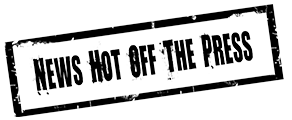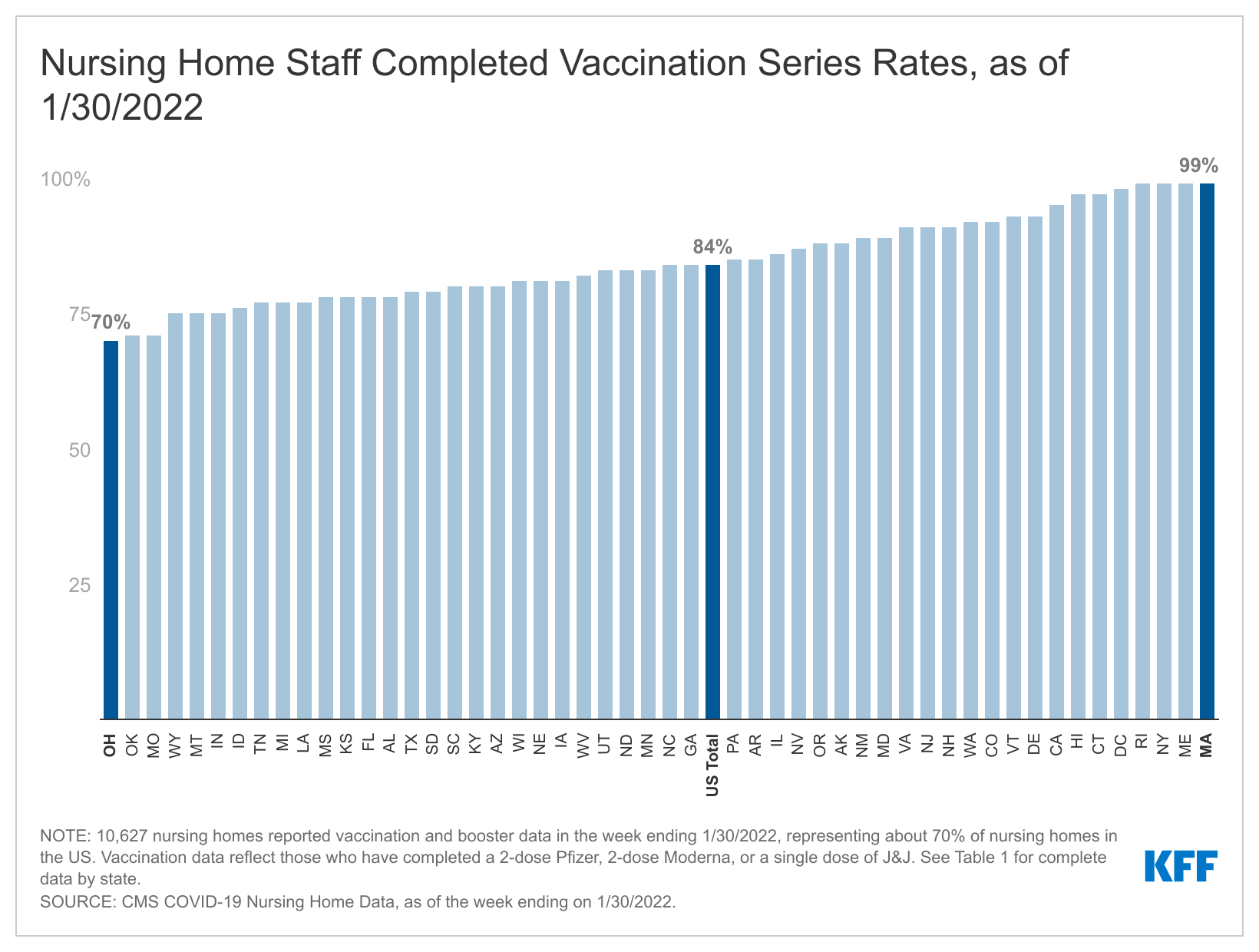Almost one in 4 COVID-19 deaths has been in a long-term care facility for the reason that begin of the pandemic. As a result of disproportionate affect of COVID-19 on this inhabitants, nursing dwelling residents and employees had been prioritized to obtain the vaccine when the vaccine rollout started in Winter 2020-2021. Since then, CMS has applied a well being care employee vaccination mandate for suppliers that take part in Medicare and/or Medicaid. Though some states have sued to problem this rule, it was just lately allowed to take impact by the Supreme Courtroom.
Partially because of the litigation, amenities in numerous states have completely different deadlines to adjust to the brand new rule. CMS steering requires employees to have obtained their first vaccine dose or have a pending or accredited exemption by January 27th in 26 states (25 states plus D.C.), together with 25 that didn’t sue to problem the rule, and Florida, the place courts refused to dam the rule. Further CMS steering units a February 14th deadline for workers to have obtained their first vaccine dose or have a pending or accredited exemption request after the Supreme Courtroom allowed the rule to take impact in 24 different states that challenged the rule. Lastly, CMS steering units a February 21 deadline for Texas, the place a lawsuit was dismissed after the Supreme Courtroom’s determination. All steering specifies that if by the dose one deadline, a facility is above 80%, and has a plan to attain a 100% single-dose employees vaccination fee inside 60 days of the deadline, they won’t be topic to extra enforcement motion.
This knowledge notice presents accomplished vaccination and booster charges amongst nursing dwelling employees, by state. This evaluation doesn’t categorize states or amenities by compliance since deadlines for all states haven’t handed and facility-level knowledge is lagged. This evaluation presents knowledge on accomplished vaccinations on the state-level fairly than on the facility-level, although this coverage can be enforced on the facility-level. Future analyses will consider the share of amenities in every state in compliance with the rule as soon as compliance deadlines for each doses have handed.
Accomplished vaccination refers to those that have accomplished a 2-dose Pfizer, 2-dose Moderna, or a single dose of J&J. Booster knowledge replicate any extra dose of vaccination. This evaluation makes use of federal nursing dwelling knowledge as of January 30th, 2022 to calculate employees vaccination and booster charges among the many 26 states with the January 27th first-dose deadline, and as a baseline for assessing the remaining 25 states with first-dose deadlines that observe in February. The evaluation relies on 10,627 nursing houses reporting full knowledge (roughly 70% of all nursing houses). The information on this piece had been reported after the January 27 dose one deadline in 26 states; the dose one deadline has not but handed within the remaining 25 states, as famous above. Desk 1 offers detailed state-level knowledge.
Because the deadline for first doses for well being care staff handed in 25 states + D.C., and approached within the remaining states, nursing dwelling employees accomplished vaccination charges diversified broadly by state, starting from 70% in Ohio to 99% in Maine, Rhode Island, New York, and Massachusetts for the week ending January 30th, 2022 (Determine 1 and Desk 1). Nationally, the nursing dwelling employees vaccination fee is about 84%. Twenty-three states reported employees vaccination charges increased than the nationwide common. Of those 23 states, 14 states plus D.C. reported employees vaccination charges of over 90%. 4 states reported a near-universal employees vaccination fee of 99%. Twenty-six states reported employees vaccination charges decrease than the nationwide common, with 16 of those states reporting even decrease employees vaccination charges underneath 80% (Determine 2). All 16 of those states are positioned within the South, Midwest, and Rocky Mountain areas of the U.S. (Determine 2). CMS cited variation in employees vaccination charges by state and area as an element resulting in the adoption of the rule.
The 26 states that had been topic to the January 27th deadline for the primary dose of the COVID-19 vaccine reported increased accomplished vaccination charges (89%) than the 25 states topic to the February deadlines (77%) (Desk 1). Within the 26 states the place employees had been required to obtain their first dose by January 27th, the finished employees vaccination fee was 89% as of January 30th. Nursing houses within the remaining 25 states topic to the February deadlines – February 14th (24 states) and February 21st (1 state) – reported a decrease employees vaccination fee of 77%, possible reflecting a mixture of federal mandate deadlines not but passing, a scarcity of state and/or native mandates, and completely different levels of vaccine hesitancy amongst employees.
Whereas the brand new CMS rule doesn’t require employees to obtain booster photographs, nursing dwelling employees booster charges additionally differ throughout states, starting from 17% in three states (Louisiana, Missouri, and Mississippi) to 56% in California (Determine 1 and Desk 1). Nationally, booster charges amongst nursing dwelling employees are about 28%. These values symbolize the share of all employees who’ve obtained their booster, though some who had been vaccinated extra just lately might not have been eligible for his or her booster by January 30th (the latest knowledge printed). People who obtained the Pfizer-BioNTech or Moderna vaccines develop into eligible for boosters 5 months after finishing their major vaccination sequence. People who obtained Johnson & Johnson’s Janssen vaccine are eligible for boosters two months after receiving their shot. States with the sooner dose one vaccination deadline additionally report increased booster charges than states with a later dose one vaccination deadline. State stage variation in booster charges might replicate variations in attitudes or hesitancy about boosters.
Within the aftermath of the Supreme Courtroom’s determination permitting the rule to take impact, litigation difficult this rule continues in Louisiana, the place 14 states difficult the rule are in search of so as to add new claims to their lawsuit, and Tennessee and Virginia are in search of to affix the challengers’ case towards the federal authorities. The rule, which was issued as interim last, might also be revised as CMS critiques public feedback earlier than issuing a last rule. As the assorted deadlines move, nursing houses might be topic to enforcement of this rule via various mechanisms, together with civil financial penalties, denial of funds, and termination of participation from the Medicare and Medicaid applications. CMS steering emphasizes that their “major objective is to convey well being care amenities into compliance” and termination would possible happen “solely after offering a facility with a possibility to make corrections and are available into compliance.” When issuing the rule, CMS acknowledged that some employees might depart their jobs as a result of they don’t wish to obtain the vaccine however cited examples of vaccine mandates adopted by well being programs in Texas and Detroit and a long-term care mother or father company with 250 amenities in addition to the New York state well being care employee mandate, all of which resulted in excessive charges of compliance and few worker resignations. As with different Medicare and Medicaid federal supplier necessities, state surveyors may have major accountability for imposing the rule as a part of routine inspections. Nevertheless, CMS has notified states that it could scale back the quantity of federal cash that states obtain to assist facility oversight and redirect these funds to assist federal oversight actions if states don’t embrace facility compliance with all federal necessities of their oversight.







